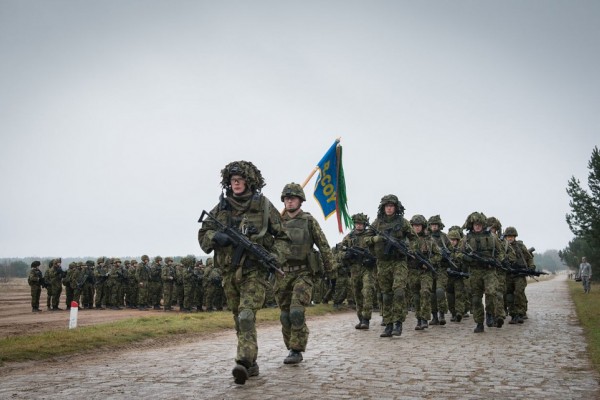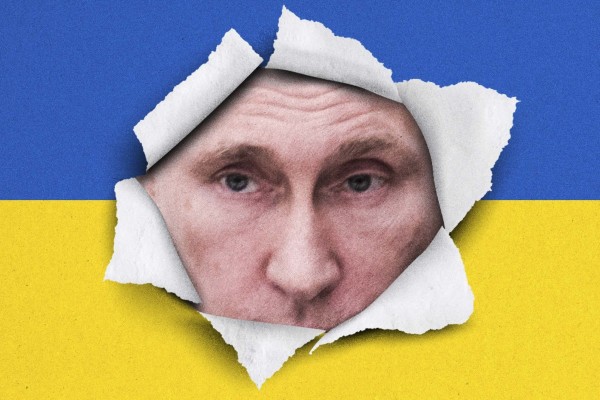Children are bearing the brunt of Russia’s war
More than half of Ukraine’s child population—4.3 million out of 7.5 million—has been displaced as a result of the invasion

A woman with a child evacuates from a residential building damaged by shelling in Kyiv, Ukraine, March 16, 2022. Photo courtesy the State Emergency Service of Ukraine.
Who does Russia’s invasion of Ukraine benefit?
According to Vladimir Putin, it will benefit the Ukrainians, particularly the Russian-speaking population in the country’s east, whom he claims are in the process of being liberated from the yoke of a neo-Nazi state. One should not be quick to accept this rhetoric of humanitarian interventionism, language that is often an eye-catching lacquer with which states coat their otherwise grim and unappealing geopolitical objectives.
Putin and his allies within Russia would not have embarked on this invasion if they did not believe it would benefit them in some way. One might argue that it will solidify their power domestically, energizing the population with a jolt of nationalist fervour at a time of waning popularity for the president while providing the opportunity to smear any vocal opponents as fifth columnists and punish them accordingly.
In these ways, former Russia-based journalists and current Radio War Nerd hosts Mark Ames and John Dolan see many parallels to Boris Yeltsin’s war in Chechnya: namely, the loss of domestic credibility presaging the attack and the undemocratic way in which the war was launched. The main difference is that Yeltsin’s war was financed and supported by the West, while Putin’s war is a thumb in the eye of the Western elite as much as it’s also a knife in the gut of many of the most economically vulnerable Ukrainians.
If one were to ask select US officials, including former Secretary of State Hillary Clinton, who the war benefits, they would reply that it may benefit US strategic interests. As she recently stated in an interview with MSNBC, the US views the war in Ukraine as an opportunity to create “unintended consequences” for Russia on the model of US support for the Afghan mujahideen against the Soviet military in the 1970s and 80s.
It is disquieting that senior US officials continue to view Afghanistan as an example of US foreign policy gone right, since it utterly devastated the country, destabilized the broader Middle East, and prompted the rise of al-Qaeda. From their perspective, however, it also hastened the fall of the Soviet Union and led to the rise of Yeltsin, who was as subservient to US interests as the most desirable client state.
One can see that elements of the US state view the war in Ukraine as a geopolitical triumph in the making, and a potential cause for celebration. American arms manufacturers are likely celebrating as well, as massive weapons transfers to Ukrainian forces bring in sky-high profits even while they increase the risk of nuclear confrontation with Russia.
It seems that this war has benefitted the least moral and most cynically self-serving people on both sides of Ukraine—using the country as a proxy to achieve their national interests. One might also argue that it has benefitted the most sordid elements within Ukraine itself, as far-right militias such as the Azov Battalion receive huge shipments of advanced weaponry alongside helpfully positive coverage by major Western media outlets.
Does the war benefit anyone else in Ukraine? Likely not. While it is true that Russia is holding back the majority of its air force, thus refraining from prosecuting a “shock and awe” bombing campaign of the type the US launched in Iraq, the human toll of the invasion has been cataclysmic, with horrible effects for the most defenceless people in Ukraine—particularly children.
Even before the Russian invasion, child poverty rates in Ukraine were startling, the combined result of post-Soviet economic liberalization, the war in the Donbas, and the institutional effects of the COVID-19 pandemic. In a country where political and economic power is concentrated in the hands of several billionaire oligarchs, the mercenary inheritors of many post-Soviet industries, it was unlikely that the situation for poor children would ever substantively improve. Now, the Russian invasion has made any near-future changes simply impossible.
UNICEF measures child poverty based on nine indicators, which it calls “deprivations.” If a child lives with three of nine deprivations, they are considered impoverished. These include lack of funds to pay rent, mortgages, or housing and utilities; lack of funds to warm their home; inability to meet unexpected but necessary expenses; lack of funds to afford a meat with meat, chicken, fish, or the vegetarian equivalent every second day; lack of funds for at least one week of family holiday per year; lack of a car; lack of a washing machine; lack of a colour television; and lack of a telephone.
2019 statistics on child poverty in Ukraine found that children are significantly more likely than adults to endure poverty. UNICEF research reveals that 33 percent of households with children lived in a state of “material deprivation” (three of nine deprivations), while 19 percent were in a situation of “deep deprivation” (four of nine).
The picture becomes somewhat clearer when we compare Ukraine’s pre-invasion child poverty rates with those of surrounding countries. In 2019, Ukraine’s overall poverty rate was 5.6 percent. In Belarus, the poverty rate was 0.8 percent; in Poland, 1.4 percent; in Hungary, three percent. In Europe, only Moldova and Romania surpassed Ukraine, with 15.6 percent and 16.3 percent respectively. Nevertheless, in 2019 Ukraine had a massively disproportionate child deprivation rate of 47.3 percent, an increase of 17.3 percent from 2008. For comparison, the child poverty rates in Moldova and Romania, two countries with higher overall poverty rates, were substantially lower than Ukraine’s (24 percent and 32 percent respectively). The average child poverty rate for EU members was 13.6 percent.
Ukraine’s absolute child poverty rate spiked after the US-supported Maidan coup of 2014 (in 2014, 36 percent of children lived in poverty; in 2015, 67 percent). That number gradually lowered in subsequent years, but never returned to pre-Maidan levels. After the onset of the COVID-19 pandemic in early 2020, UNICEF predicted that the absolute poverty rate in Ukraine would rise to 44 percent, and the child poverty rate to 51 percent.
Many children who come from economically deprived backgrounds end up in Ukraine’s notorious orphanage system. “In most cases,” reports ChildAid to Eastern Europe, “orphans are abandoned by their own family due to lack of finances to support them, however, other reasons include alcoholism, abuse, crime… and poor medical health.” These orphanages are often underfunded and lacking in necessary medical supplies and professionally trained staff; as a result, many disabled children die due to lack of appropriate medical treatment. Some children have reported suffering beatings, sexual abuse, and humiliation in these facilities. Furthermore, children can only remain in the orphanage until they reach sixteen years of age, at which point they have to leave. Between 10 and 15 percent of these orphaned kids commit suicide before they turn eighteen, and 60 to 70 percent quickly become involved in “prostitution or other organized crime” after their departure from the facility.
At the time of the invasion, there were between 100 to 200,000 children in Ukrainian orphanages. In the chaos that has resulted from Russian attacks, thousands of these kids remain unaccounted for, possibly kidnapped by human traffickers who are lying in wait on the Poland-Ukraine border.
Adding to the horror, a UNICEF report from March 24 found that more than half of Ukraine’s child population—4.3 million out of 7.5 million—has been displaced as a result of the invasion. Nearly two million kids have fled to neighbouring countries, while 2.5 million remain internally displaced. Within the country, 1.4 million people lack access to clean water, 4.6 million have limited access, and almost half-a-million infants aged six to 24 months require complementary food support.
It is obvious that NATO and the US are not Russia’s moral superiors in any aspect of international policy—after all, Human Rights Watch recently reported that 13,000 newborns in Afghanistan have starved to death in 2022 due to US sanctions on the Afghan state—but we should not allow the undeniable hypocrisy of the states aligned against Russia to distract us from the appalling human consequences of the invasion.
There are no moral state actors in this disaster. We should not forget that, although the US raised tensions at every turn, driving NATO toward Russia’s Western border while demonizing Putin and refusing to seriously engage with Russia’s security demands, the Russian state could have responded in many ways short of a military invasion. And now, one month into the attack, the world is in a position where de-escalation seems unlikely, nuclear confrontation is not out of the cards, and the most conservative and militaristic elements on both sides of the conflict have benefitted.
The children of Ukraine have sworn no allegiance to the US, NATO, or Russia. Before they were the victims of war, they were the victims of a cruel system that never took their basic needs into account. Now, their situation is even worse than before—and showing no signs of abating.
Owen Schalk is a writer based in Winnipeg. His areas of interest include post-colonialism and the human impact of the global neoliberal economy. Visit his website at www.owenschalk.com.










